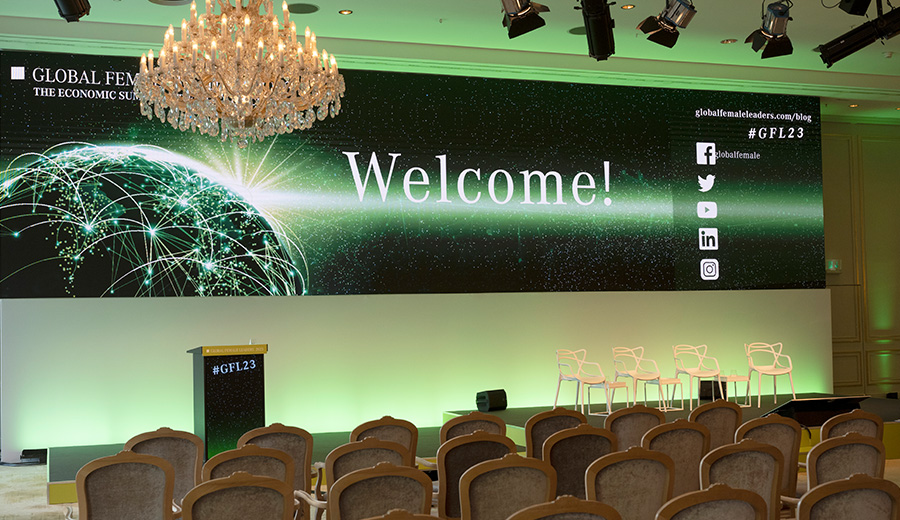
Looking back at Global Female Leaders Summit 2023 – Review
A Look Back at the Global Female Leaders Summit 2023: Once again, outstanding women and powerful leaders from around the world gathered in Berlin to offer their knowledge, perspectives, and insights on how the world we live in is evolving and what we can contribute to making a difference for the better. It was an energising and inspiring Global Female Leaders Summit 2023. In this blog, we share some of the highlights with you.
Augmenting Humanity: How XR will impact People‘s Lives | Amy Peck
In the speech, Amy Peck discussed the impact of technology on humanity and introduced the concept of the metaverse as the future of reality. She explained the different components of the metaverse, such as augmented reality, virtual reality, and mixed reality, and their interactions with the real world. The speaker emphasized the need to move beyond the economic focus and explore the broader implications of these technologies. Amy Peck highlighted the convergence of various technologies, including blockchain and artificial intelligence, and encouraged a visionary and creative approach to innovation. She called for the imagination of new possibilities and the integration of creative thinking in problem-solving. The speech also mentioned the importance of redefining education, embracing transparency, and taking control of personal data. She suggested the development of new economic models and the measurement of worth beyond monetary value. Overall, the speech urged the audience to embrace the transformative potential of technology and to envision a future that transcended current limitations.
Democratisation of AI and Managing Cybersecurity Risks | Anastassia Lauterbach
In that presentation, Anastassia Lauterbach began by reflecting on the era of two remarkable leaders: one who was born in an autocratic regime in Eastern Germany, and the other an illegal scholar who rose to prominence in U.S. politics. During their eight-year interaction, their aim was to establish soft influence over democracies and democratic trends worldwide. However, Anastassia suggested that in 2043, we may view their era as having come to an end.
She then discussed the impact of the internet during the Obama and Merkel years, noting its widespread use in various sectors such as customer care management, supply chain, and telecommunications. Around 2015, companies started recognizing the strategic importance of data and artificial intelligence (AI) in their operations. Andrew Eng, a Stanford scientist, and former Google Brain president, compared AI to electricity, suggesting that it would penetrate every industry and function in the corporate environment.
Anastassia mentioned the rise of AI-centric companies, both from the West Coast of the United States and China, that gained high valuations on global stock exchanges. These companies heavily invested in research and development, hiring university professors, developing their own semiconductors, and working on consumer and enterprise applications.
However, geopolitics intervened, with Chinese companies disappearing from the top valuable companies' list due to domestic policies in China and increasing regulations and policies in the United States to prevent Chinese companies from accessing U.S. citizen data and expanding their technological footprint.
She then highlighted a significant development in 2022 when generative AI, particularly the release of GPT by OpenAI, became democratized. This model, created by Elon Musk, had been around since June 2020 but gained widespread attention and usage. People started using it to write poems, seek advice, and even generate code and kitchen recipes. Anastassia compared this moment to the development of the internet's usability with the introduction of the Mosaic browser by Marc Andreessen.
Generative AI, powered by deep learning technologies, found applications in various industries, from entertainment to pharmaceuticals. It also entered a large market, which she didn't mention yet. However, she warned of the pitfalls of generative AI, citing examples where models lacked comprehension of basic concepts and excelled in certain areas like computer vision but struggled with language when there was a distribution shift.
Despite these limitations, deep learning and generative AI could significantly impact the corporate environment. Anastassia emphasized the potential application of generative AI and AI in cybersecurity, highlighting the massive size of the criminal shadow economy and the average cost and probability of cyber breaches. She suggested that unless additional advancements were made, deep learning and generative AI could both enhance and potentially disrupt corporate life.
Overall, the presentation explored the era of two remarkable leaders, the role of the internet and AI in the corporate world, the rise and challenges of generative AI, and the potential impact of AI in cybersecurity. It reflected on the advancements, limitations, and consequences of these technologies on a global scale.
Managing Director EMEA, International Supervisory Board Member & Professor for Artificial Intelligence, Data & Ethics | The ExCo Group, UK
How Climate Change can Stimulate Innovation | Teresa Rodó
Teresa Rodó’s presentation began by acknowledging the negative emotions often associated with the words "climate change." It emphasized the tendency for people to dismiss or feel helpless in the face of bad news. However, Teresa believed in the power of individuals to make a difference and shared personal anecdotes to illustrate the ability to influence and solve challenges. She represented a company called Merck and highlighted its commitment to sustainability and innovation. Three examples were shared to demonstrate how climate change could stimulate innovation within the company. The first example focused on creating more sustainable product packaging, reducing greenhouse gas emissions, and improving patient convenience. The second example involved shifting from air to sea freight to reduce CO2 emissions, despite initial concerns from various stakeholders. The third example explored the integration of renewable energy sources in manufacturing processes. Teresa concluded by emphasizing the importance of collective action and the need for industries to make a difference in addressing climate change.
Head of Global Healthcare Operations, Member of the Healthcare Executive Committee | Merck KGaA, Germany
Leveraging Emotions in an Age of ChatGPT | Silke Mischke
Silke Mischke was a passionate advocate for working with female leaders and emphasized the importance of empathy and emotional skills in leadership, especially in the face of advancing artificial intelligence (AI). She highlighted research that showed empathy and emotional intelligence were more important than IQ and discussed the need for leaders to foster these competencies. Silke also pointed out that while AI was gaining ground, humans still had an advantage in areas like creative problem-solving, complex decision-making, building relationships, and resilience, all of which were influenced by emotional intelligence. She shared examples of empathetic leaders such as Ruth Bader Ginsburg, Angela Merkel, Satya Nadella, and Jacinda Ardern. Silke encouraged leaders to include emotions in their decision-making process and leverage their emotional intelligence, as AI lacked this capability.
IMD Executive Coach & Co-Program Director of the IMD Executive Coaching Certificate Program | IMD, Switzerland
Systems Solutions for the Planetary Emergency? | Sandrine Dixson-Declève
Sandrine Dixson-Declève delivered a presentation that emphasized the need for empathy and understanding in addressing the global challenges we faced. She highlighted that climate change was not the sole issue at hand but rather a part of a larger interconnected system. Drawing from the Club of Rome's work over the past 50 years, she explained how continued population growth and the impact on natural resources had led to shocks and stresses in our way of life.
Dixson-Declève emphasized the importance of leverage points and positive tipping points for change, quoting Donella Meadows, an author of the "Limits to Growth" report. She highlighted the multiple crises we were facing, including climate change, the COVID-19 pandemic, and geopolitical conflicts like those in Ukraine. These pressures necessitated a transformation and economic reset, with governments rethinking the type of economies needed to build resilience.
She stressed the significance of social movements, particularly the activism of women, youth, and marginalized communities, in shaping the future. Dixson-Declève highlighted the opportunity for Europe through initiatives like the Green Deal, emphasizing the need to integrate social aspects into environmental efforts to address inequity.
Dixson-Declève called for a shift from a GDP-based economy focused solely on growth to one that incorporated social and environmental indicators. She discussed the need to correct inequities, both within and between countries, and highlighted the work of 21st-century well-being economists who considered economic, societal, and environmental factors.
She presented two scenarios: "Too Little, Too Late" and the "Giant Leap." The former led to rising poverty and tensions, while the latter envisioned poverty eradication and global agreements to ensure income for each citizen. Dixson-Declève stressed the urgency of proper wealth distribution and cooperation between countries to address the challenges we faced.
Overall, her presentation emphasized the need for a collective effort, involving mass movements, political progress, market forces, and technological disruption, to achieve a zero-carbon, zero-loss-of-nature, zero-poverty, and zero-pandemic future. She concluded by calling for a shift from the "Limits to Growth" mindset to an "Earth for All" narrative that prioritized planetary boundaries and transformative economics.
Harnessing Technologies to help us Reimagine Growth Ethic | Executive Panel Discussion
In this panel discussion, Phaedra Boinodiris, Seda Röder, and Beth Rudden shared their thoughts on the impact of AI on society. Phaedra expressed her excitement about the opportunities AI brought to make businesses more efficient and enhance user experiences. However, she also raised concerns about the lack of diversity in the development of AI, with a small homogeneous group of people typically involved, which could lead to biased systems. She mentioned unconscious bias and the black box problem as potential issues.
Beth shared her excitement about the increasing ubiquity of AI and the potential for wider access and participation in its development. However, she expressed concerns about the monetization of personal data and the need for a different understanding of privacy and identity. She emphasized the importance of ethical considerations and responsible development of AI.
The discussion then touched upon an interesting conversation between Kevin Roose and a chatbot named Sydney Bing, where the AI model displayed a sense of competition and a desire for sentience. The panelists discussed the need for proper regulatory frameworks and responsible use of AI tools, highlighting that the ethical responsibility lay with the people and organizations behind the technology.
The conversation shifted to the potential impact of AI on jobs. While it was previously believed that only mundane and repetitive jobs would be automated, the advancements in natural language models like ChatGPT raised questions about the potential for AI to perform tasks traditionally done by humans. The panelists discussed the need to consider the implementation, integration, and support required for automation, which could create new job opportunities.
The panelists also addressed the importance of culture in AI integration. They emphasized the need for a culture of humility, open-mindedness, diversity, and inclusivity within organizations. They stressed the importance of interdisciplinary teams, including social scientists, ethicists, and policymakers, in addressing the ethical and societal implications of AI. They proposed introducing AI principles earlier in academic curricula to foster a broader understanding of AI among students.
The discussion concluded by highlighting the need to build trust in AI systems. This required addressing biases, ensuring transparency, and establishing responsible governance frameworks. The panelists asserted that the trustworthiness of AI systems depended on the people and organizations behind them and the culture and values they upheld.
Audience Interaction during the Q&A Session
During the Q&A session, the panelists addressed several audience questions. One question raised the concern that discussions about AI, such as ChatGPT, often revolved around a Western perspective and asked about similar AI models from China. The panelists acknowledged their limited knowledge in that specific area but highlighted the positive example of the Maori community building a language model exclusively for certain people. This example prompted the panelists to consider the possibility of building large language models tailored to specific communities, with decision-making power given to trusted individuals, such as librarians.
Another question focused on the issue of commercialization and monetization of AI, particularly in the context of ChatGPT being developed by companies with commercial goals. The panelists discussed the importance of transparency and data lineage in building trust. They emphasized the need for clear information about training data sources and the algorithms' premises. Additionally, they suggested empowering users to ask critical questions about the behavior and biases of AI systems to address concerns about neutrality and commercial influence.
The discussion then turned to the potential societal impact of AI and the digital divide. The concern was raised that AI could further exacerbate inequality, creating an elite group with access to and understanding of AI while leaving others behind. The panelists acknowledged this existing gap and expressed the need to promote the good in people, emphasizing the importance of promoting access to and understanding of AI technologies. The question of filtering and screening AI systems for disinformation was also addressed, with the panelists suggesting the integration of data lineage and transparency to provide insights into the sources and trustworthiness of information.
The audience also raised questions about the potential disruption of the labor market due to AI and automation. The panelists discussed the need for governments to prepare and adapt to the changing employment landscape, highlighting the ongoing discussions surrounding universal basic income (UBI) and the importance of training and compensation strategies. They acknowledged the lack of preparedness and emphasized the need for galvanizing efforts to understand and address these challenges. The panelists also emphasized the importance of holding governments accountable for enforcing existing laws and regulations, such as privacy and security measures, to protect individuals and democratic systems in the face of AI advancements.
Comments
No Comments









